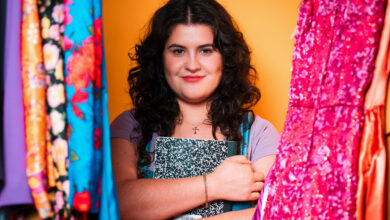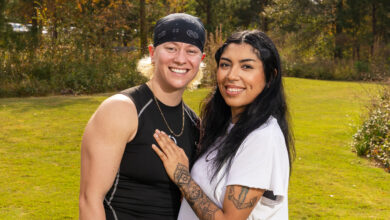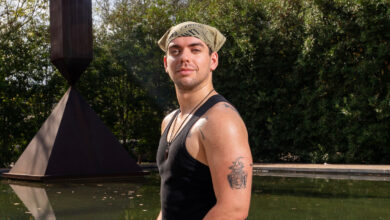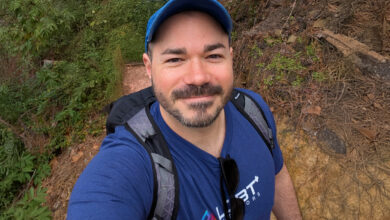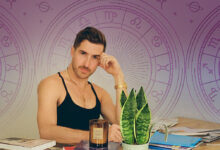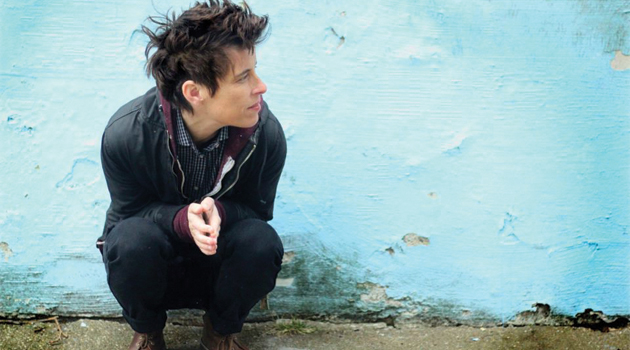
Speaking to the Heart
Poet Andrea Gibson seeks social change through the spoken word.
by Megan Smith
Pulitzer Prize-winner Rita Dove once said, “Poetry is language at its most distilled and most powerful.” When listening to the words cast out into the world by queer-identified activist and poet Andrea Gibson, nothing rings truer. Gibson’s work is raw and fearless, picking away at patriarchy, gender norms, and privilege. Her words lead you into battle, but never let go of your hand—you’re in this together, learning the best way to bring about social change side-by-side. Now on her sixth album, Truce, Gibson is far from losing momentum. I had the pleasure of speaking with Andrea about her inspirations, self-discovery, and future activism.
Megan Smith: Why were you first drawn to spoken word versus other, more traditional forms of activism?
Andrea Gibson: I discovered spoken word in the same year that I got involved with Vox Feminista, a radical political performance group of artists bent on social change. I think the fact that I was participating in my first political actions at the same time that I was falling in love with poetry really affected the way I approach writing, as well as the way I approach the world. I think speaking up is important. I think acting up is vital.
How do you think your message differs because it is delivered through poetry?
With poetry, I’m not aiming to change people’s minds. Instead, I’m hoping to reach people’s hearts. I think the heart is more open than the mind, so I think spoken word helps me tap into what is possible.
Can you describe the first time you got on stage to perform? What was that experience like, and what topic did you tackle?
I had terrible stage fright that kept me off the stage for many years. When I finally got up the nerve to read a poem at an open mic, my hands were shaking so frantically that the paper I was holding was rattling louder than my voice. I can’t remember the topic of the poem I was reading. All I know is that I was terrified, and I wanted to do it again.
You take on heavy subjects like deconstructing gender norms, patriarchy, and sexuality in your art. What keeps you motivated to keep going when you’re feeling drained?
I get a ton of motivation from the community of artists and activists in my life and also from the community of people who attend my shows…meaning people who are open-hearted and gusty in their vulnerability. I feel constantly inspired by anyone who is willing to face the truth of things with a willingness to add some light.
Do you have a favorite means of self-care?
Dancing to ’80s remixes.
Which authors and poets inspire your own work the most?
Rachel McKibbens, Sonya Renee, Denise Jolly, Derrick Brown, Patricia Smith, Shira Erlichman, Mindy Nettifee . . . I could go on and on with this list.
How do you feel Truce differs from your previous five albums?
I think it’s the first album where I actually start exploring my own shame, the first album where I start to dismantle self-hate, and the first album where I unravel for myself the idea of forgiveness.
One of the album’s singles, “Panic Button Collector,” discusses wrestling with panic disorder and anxiety issues. Why do you think mental health issues are so shamed in our society, and how can we turn that shame into support?
I don’t think I can briefly articulate why there is so much shame around mental health issues. I think some reasons are universal and some vary from culture to culture, but simply talking about it is key to things shifting. I know, for myself, hiding what I’m feeling only makes that feeling more unbearable. It’s been a relief to finally start talking about it on stage, in a really public forum, and to share stories with people who experience similar things. No matter what you are feeling, to know you are not alone can offer a huge comfort.
One of my favorites from Truce is “Touring with a Black Poet,” in which you share your experiences of recognizing your own white privilege. Can you speak a little more as to what that process was like for you? It’s an ongoing process, of course.
Years ago while working with Vox Feminista, we wrote and performed a show titled “White Lies,” and that was the first time I really started actively unpacking my privilege as a white person. A while after that I started touring with Sonya Renee, who inspired the poem “Touring with a Black Poet.” I was shaken by the degree to which her experience on the road was different from mine. White privilege is something that has come up frequently in my writing over the years, but this is the first year I’ve consistently acknowledged on stage that I don’t believe I would have a career in poetry if I were not white, and I think that acknowledgement is long past due. One of the primary things I learned on that first tour with Sonya is that it should never be the responsibility of people of color to educate white people about their privilege. I have spent too much of my life silent on this subject, I am still learning how to be an active ally, I mess up a lot, and I am deeply grateful to Sonya for her wisdom and friendship, and for being one of the most committed activists I know.
If you could write poems about one thing for the rest of your life, what would it be?
I would write love poems, for certain. I’d just need the world to look a whole lot different than it does now.
You recently launched the website Stay Here with Me, which you created because you “want people to stay alive,” and you also “want people to want to stay alive.” Can you tell us a little more about this project and the response you’ve gotten so far?
I co-created Stay Here with Me with my good friend Kelsey Gibb. Kelsey is a qualified mental health professional, a dedicated activist, and just an all-around brilliant heart. The site is an art-focused space that aims to create a community of people supporting each other in staying alive. Our hope is to remind people that they are not alone, and to increase visibility and discussion around issues of mental illness and suicide. We are continuously inspired by the people that share their stories on the site!
I read that you still get stage fright, even though you always appear collected while you perform. Do you have any advice for young activists and artists that are nervous about getting up on that stage?
I’d say…energy is energy, and nervous or even terrified energy can be shifted into fuel for the poem. I find I get more nervous the less I welcome my fear. So my advice would be to welcome the fear and to give it space to live in the reading of the poem. Let whatever you’re feeling be visible to the audience. Give yourself permission to not hide.
What can we expect to see from you next?
I’ve had the opportunity to collaborate with more musicians this year than I ever have in the past. I hope to continue doing more of that throughout the year. Also, Sonya Renee started a project called “The Body Is Not an Apology” that’s really been inspiring my writing lately. The idea of radical, unapologetic self-love is finding its way into my work more than ever before, and I’m looking forward to sharing those pieces very soon.
Andrea Gibson performs in Houston at The Studio at Warehouse Live, 813 Saint Emanuel Street, on January 18. Tickets: warehouselive.frontgatetickets.com.



